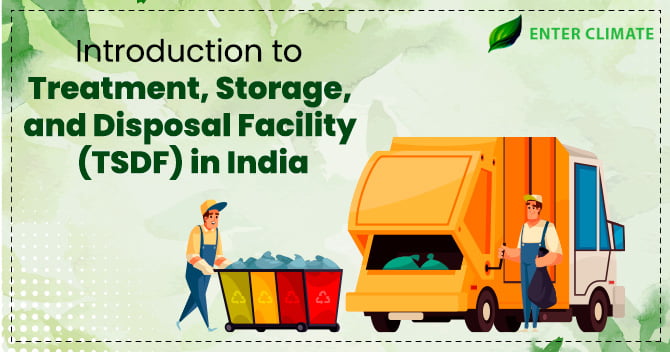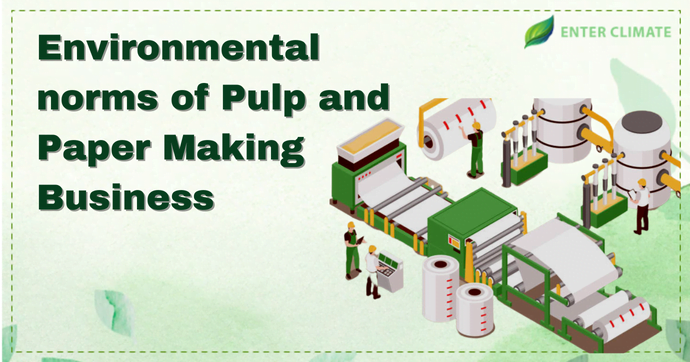Hazardous waste Authorisation renewal Process for Waste Management
 02 Sep, 2023
02 Sep, 2023 
As our way of life evolves, we utilise various chemicals and products within our households. Regrettably, we might not always be conscious of their corrosive, explosive, flammable, or toxic nature. These substances fall into the hazardous waste category, and it is crucial to segregate them from wet and dry waste. Mishandling these materials can pose risks to our well-being and even to the environment. Therefore, it is imperative to manage hazardous waste appropriately, with oversight from the state pollution control board, to grant authorisation for its proper handling. Through a collaborative approach involving regulatory bodies and industries, the Hazardous Waste Authorisation renewal signifies a pivotal step toward promoting sustainable and accountable waste management practices.
Hazardous Waste Management Rules, 2016
These regulations have been put forth to ensure the safe handling, creation, processing, storage, treatment, transportation, reprocessing, collection, and appropriate disposal of hazardous waste. The Hazardous Waste Management Rules were introduced in 1989 and saw amendments in 2000, 2003, 2008 and 2016. Thereafter, the Hazardous Waste (Management, Handling, and Transboundary Movement) Rules were notified in 2016, which is the presently applicable rules under which the hazardous waste authorisation renewal is done.
These rules strongly emphasise the accountability of everyone involved in activities such as collecting, storing, packaging, transporting, processing, recycling, recovery, pre and co-processing, transfer, or disposal of hazardous waste.
Different regulations apply to diverse types of waste. For instance, waste originating from households is encompassed by the scope of the Solid Waste Management Rules of 2016. The hazardous waste produced by industries and offices has been distinctly addressed under the Hazardous Waste Rules 2016, while biomedical waste is categorised as solid waste or biomedical waste. Therefore, waste generated from healthcare establishments is governed by the Bio-medical Waste Management Rules of 2016.
Before 2022, under the ambit of “other waste”, tire waste was also covered under the HWM Rules, 2026. Therefore, in addition to the unit handling, disposal and transboundary movement, tire producers and waste management businesses were also governed by these rules. After the 6th amendment to the regulations, Schedule IX was added, introducing Extended Producer Responsibility (EPR) to tire waste. Post 2022, EPR obligations and waste management targets have been added to the rules.
Who needs Authorization
- Industrial units generating, collecting, receiving, storing, transporting, treating, disposing or handling hazardous and other wastes
- Laboratories and service stations for vehicles storing or using hazardous substances and having a regular hazardous wastes generation like spent chemicals and solvents, chemical or oil contaminated filters or cloth, chemical or oil-bearing residues, etc.
- Units/godowns/warehouses of hazardous substances (i.e. pesticides, medicines, etc.) having a regular generation of contaminated, discarded or off-specification materials.
- Units engaged in the recycling or reprocessing of hazardous and other wastes
- Units providing service of reception/ collection/ storage/ transport/ treatment/ disposal of tyre waste, bio-medical wastes or hazardous wastes.
Agencies involved in Hazardous Waste Management Authorisation
Several entities play a crucial role in issuing authorisation for hazardous waste management. These include:
- Central Pollution Control Board
- State Pollution Control Board and Pollution Control Committee
- Directorate General of Foreign Trade
- Port Authority and Customs Authority
- Ministry of Environment, Forest, and Climate Change[1]
Procedure to obtain Hazardous waste Authorisation renewal
The process for Hazardous Waste Authorization renewal involves the following steps:
- Apply to the state pollution control board by applying in Form I within a 60-day timeframe from the publication date of the relevant rules.
- The application must accompany the “consent to establish” and “consent to operate” documents.
- Ensure that all the required documents are attached to the application. An authorised individual should sign these documents.
- Submit the completed application form and supporting documents to the appropriate state pollution control board.
- Once the Board reviews the submitted form and documents, the authorisation will be granted if they meet the required criteria.
Documents required for Hazardous waste Authorisation renewal
For the Hazardous Waste Authorisation renewal, the necessary documents include:
- A covering requisition letter showing the status of the industry & activities.
- Details of any changes in the quantity of trade effluent/ sewage generated and disposal mode indicated against in the consent order (If applicable).
- Details of production capacity and actual products manufactured (if applicable) month-wise during the last 2 financial years.
- Details of changes, if any, in the emission quantity and number and height of chimney/stacks indicated against in the original consent order (If applicable).
- Latest Analysis report of the treated trade effluent/ sewage samples (If Applicable)
- Details of changes, if any, in the name or in management/ Board of Directors (If applicable).
- Latest Analysis report of the AAQ, Stack Monitoring, and Noise Level (As applicable).
- Compliance report on the latest consent or renewal of CTO order conditions stipulated under the Water & Air Acts issued.
- Compliance report on the conditions of the latest HW Authorization /BMW issued (If applicable).
- The latest Audited Balance Sheet/Auditor’s certificate showing Current Assets, Fixed Assets and Current Liabilities. and details of the last bill (If applicable).
- Details of OCMMS installed for Emissions or effluent as applicable.
- Details and mode of payment of Consent fee under the Water and Air Act.
- Complete details of systems for ZLD and details of land in case of on-land disposal and the photographs (If applicable).
Conclusion
The procedure for Hazardous Waste Authorisation renewal is a well-organised and crucial process to ensure the careful handling of hazardous waste materials. By following the prescribed guidelines, such as timely submission of applications, furnishing essential documentation, and adhering to the regulations set forth by state pollution control boards, businesses and organisations can seamlessly continue their operations while keeping a strong focus on environmental safety. This process highlights a dedication to efficient waste management and showcases a collective commitment to protecting public well-being and the natural surroundings. It is recommended to take expert guidance for Hazardous waste authorisation renewal to ensure the documents that will be required and to experience a seamless process.
FAQs
If it’s the initial application, the Hazardous Waste Authorisation renewal/ fresh application (HWA) is granted for five years starting from the date of application.
Authorisation entails granting permission for various activities involving hazardous wastes, such as their generation, handling, collection, reception, treatment, transportation, storage, reuse, recycling, recovery, pre-processing, utilisation (including co-processing), and ultimately, their proper disposal.
A producer or generator who produces fewer than 1000 kilograms of hazardous waste within a month and transports this waste over a distance greater than 500 kilometres for off-site storage, treatment, and disposal might be granted permission by regulatory bodies to store the hazardous waste on-site. This storage can extend up to a maximum of 270 days, subject to the discretion of the regulatory authorities.
The individual in charge of a location or someone representing them who plans to have their hazardous wastes managed through treatment and disposal by a Treatment, Storage, and Disposal Facility operator must provide specific information to the facility operator. The nature of this information will be determined by the State Pollution Control Board.
The Hazardous Waste Management Rules have been introduced to guarantee the secure management of hazardous waste throughout its lifecycle.
The authorisation or its renewal must be presented for examination upon the request of an officer designated by the State Pollution Control Board. The individual with authorisation is prohibited from renting, lending, selling, transferring, or in any other way transporting hazardous and other types of waste, except as expressly allowed through this authorisation.
All healthcare establishments, whether they have bedded or non-bedded facilities, are obligated to obtain authorisation from the relevant State Pollution Control Board or Pollution Control Committee (SPCB/PCC) for the proper management of biomedical waste.
Four distinct categories of waste are Industrial, Commercial, Domestic, and Agricultural.
Hazardous waste management includes a comprehensive process involving gathering, recycling, treatment, transportation, disposal and ongoing surveillance of waste disposal sites.
Hazardous waste refers to waste materials possessing characteristics that render them unsafe, posing potential risks to human health or the environment.
Read our Article:How To Obtain A Hazardous Waste Authorization Certificate?.













